17 Home Remedies For Kidney Stone Pain And Prevention Tips
Relieve your symptoms naturally with the help of these easy-to-find kitchen ingredients.
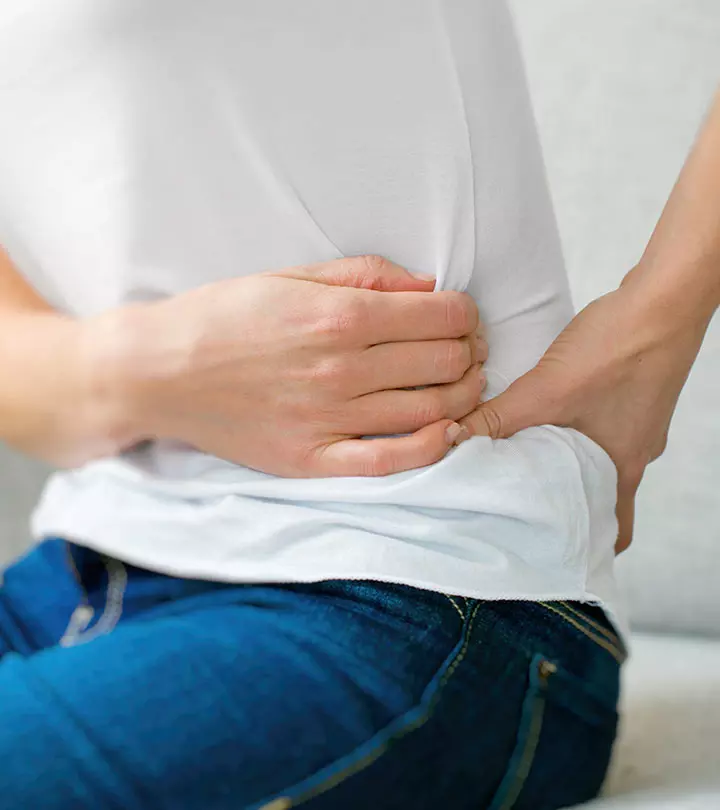
Image: Shutterstock
Kidney stones are a prevalent condition worldwide; hence, finding effective home remedies for kidney stone pain can be helpful. These stones are formed when concentrated urine forms hard mineral and salt deposits in the kidneys. Since this condition can be quite excruciating, effective pain relief methods are essential. It is tough to dilute your urine when it contains components like calcium, oxalate, and uric acid, which are prone to crystal formation. Kidney stones eventually occur as a result of this. By following a few measures like drinking water and using over-the-counter drugs, you may get some pain relief. In some rare cases, you may have to visit a doctor to remove the stones through a medical procedure. In this article, we have discussed everything about kidney stones, what causes them, home remedies, and more. Keep reading to know more!
In This Article
What Are Kidney Stones?
The hard mineral and salt deposits forming inside your kidneys are called kidney stones. Also referred to as renal lithiasis or nephrolithiasis, kidney stones usually form as a result of concentrated urine, which leads to the crystallization of minerals (1).
A study conducted on 10,521 adults over 20 years old found that the prevalence of kidney stones was 11%. It was further observed that over the course of 12 months, the incidence rate of kidney stones was 2.1%, which translates to 2,054 stones per 100,000 adults.
Key Takeaways
- Kidney stones are formed when minerals and salt deposit in your kidneys.
- The acetic acid in apple cider vinegar is effective in dissolving kidney stones.
- Compounds in basil stabilize uric acid levels in your body that prevent kidney stone formation, and acetic acid in the leaves dissolves the stones.
- The alkaline nature of baking soda helps dissolve kidney stones faster and restore the pH balance of your kidneys.
What Causes Kidney Stones?
When your urine contains substances like calcium, oxalate, and uric acid, which are prone to forming crystals, it gets difficult to dilute them.
This eventually leads to the formation of kidney stones (1). Although there is no definite cause of kidney stone formation, there are many factors that can increase the risk. Such factors include (1):
- Urinary tract infections
- A family history of stones
- Severe dehydration
- Certain fruits, vegetables, and nuts
- Being overweight
- Some medical conditions like renal tubulari A condition caused when the kidneys do not properly eliminate acids from the blood into the urine. acidosisi A condition where the body's tissues or fluids are too acidic. It happens when an acid concentration rises or when a base is lost. , cystinuriai An uncommon condition where cysteine-based kidney, ureter, and bladder stones develop. It is inherited. , and hyperparathyroidismi A condition during which parathyroid glands secrete high levels of parathyroid hormone into the bloodstream.
- Certain medications like topiramate (Topamax)
A kidney stone may not announce its presence until it passes into your ureter, a tube connecting your bladder and kidney. Upon this, you may experience the following symptoms (1).
Symptoms Of Kidney Stones
- Pain in the side, below the ribs, and in your back
- A shooting pain that radiates downwards, towards your groin and lower abdomen
- Pain while urinating
- Pink, red, or brown urine
- Nausea or vomiting
- Restrained urination
- Cloudy and foul-smelling urine
- Frequent urination
- Chills and fever (in case of an infection)
 Did You Know?
Did You Know?Kidney stone pain requires medical attention. It is essential to prioritize the advice and treatment provided by qualified healthcare professionals when dealing with kidney stones. However, under the supervision of your healthcare provider, you may also employ some natural at-home solutions to ease your discomfort. Here are some wonderful natural home remedies for kidney stones.
Home Remedies To Treat Kidney Stones
- Essential Oils
- Apple Cider Vinegar
- Certain Vitamins And Minerals
- Green Tea
- Cranberry Juice
- Lemon Juice
- Tomato Juice
- Pickle Juice
- Basil Juice
- Water
- Epsom Salt Bath
- Baking Soda
- Garlic
- Wheatgrass Juice
- Heating Pad
- Massage
How To Treat Kidney Stones Naturally
1. Essential Oils
Essential oils are packed with many therapeutic benefits. However, before using essential oils to treat kidney stones, note that it is only a complementary approach to medical treatment and must be followed under the guidance of a qualified healthcare provider. It is important to use essential oils cautiously and in accordance with their recommendations.
a. Grapefruit Oil
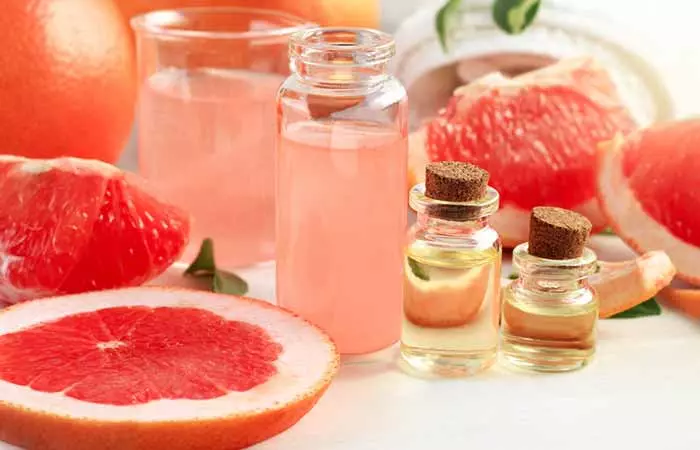
You Will Need
- 2 drops of grapefruit oil
- 1 glass of water
What You Have To Do
Add 2 drops of grapefruit oil to a glass of water and consume daily.
How Often You Should Do This
Twice daily.
Why This Works
Grapefruit (Citrus paradisi) essential oil has natural diuretici A compound or agent that boosts urine flow and discharge, helping the kidney get rid of unwanted water and sodium. and antioxidant properties that may help flush the toxins out of your body. The oil is also anti-inflammatory (2). Some believe these properties may also help relieve some of the symptoms of kidney stones.
 Quick Tip
Quick Tipb. Helichrysum Oil
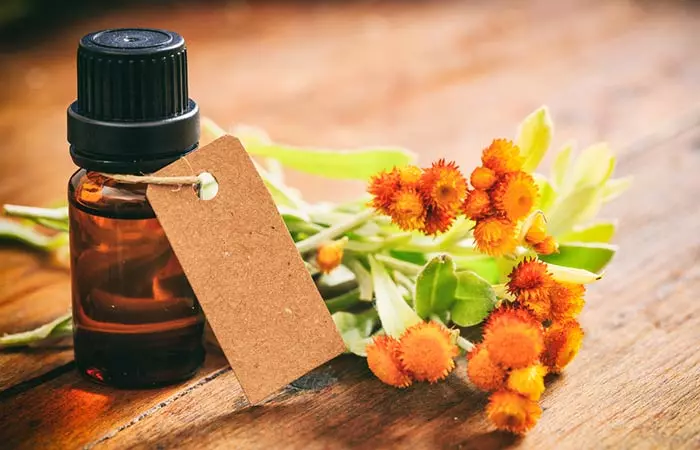
You Will Need
- 3 ml of Helichrysum oil
- 100 ml of any carrier oil (coconut or olive oil)
What You Have To Do
- Mix helichrysum oil with any carrier oil.
- Apply this mixture to your lower abdomen and the sides.
How Often You Should Do This
Twice daily.
Why This Works
Helichrysum essential oil possesses anti-inflammatory andantispasmodici A medicine that treats or prevents the occurrence of muscle spasms, particularly those that affect smooth muscle, such as the gut wall. properties (3),(4). Some believe these properties may help relieve the discomfort associated with kidney stones. The oil is also a mild diuretic that may help flush out toxins from your kidneys.
2. Apple Cider Vinegar
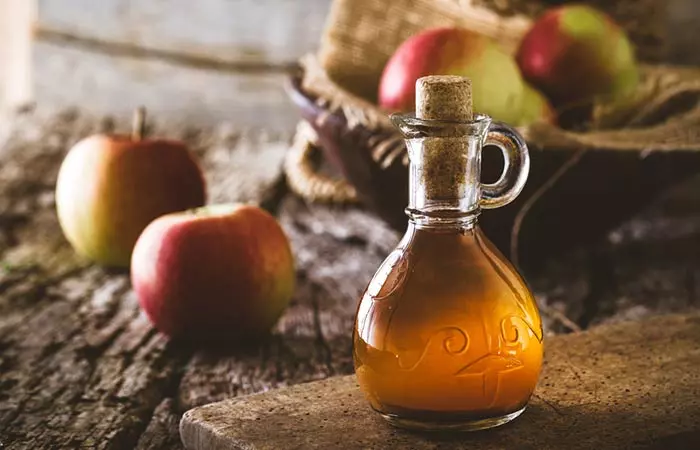
You Will Need
- 2 tablespoons of apple cider vinegar
- 2 liters of water
- Honey (optional)
What You Have To Do
- Add 2 tablespoons of apple cider vinegar to 2 liters of water and mix well.
- Add a little honey to taste, and drink this solution throughout the day.
How Often You Should Do This
Multiple times, daily.
Why This Works
Apple cider vinegar (ACV) is primarily composed of acetic acidi A colorless organic acid with a strong unpleasant smell that functions as an antibacterial food preservative and acidity regulator. and trace amounts of citric and malic acids. Some anecdotal evidence suggests that the acid content of ACV may be effective in dissolving kidney stones. However, there is no scientific evidence in this regard. We recommend you consult your doctor before following this remedy.
3. Vitamins And Minerals
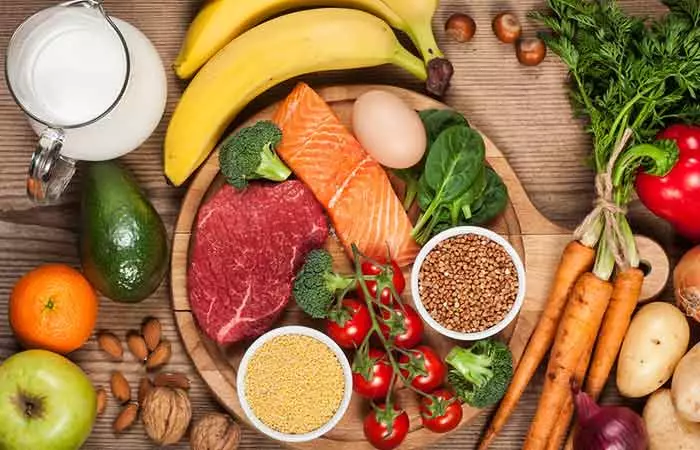
The intake of certain vitamins and minerals is also associated with a lower risk of kidney stones. Hence, having certain foods for a healthy kidney is essential as they include these vital vitamins and minerals. Vitamin B6, consumed daily, was found to lower the risk of kidney stones. Minerals like magnesium and calcium also reduce the risk of stone formation.
Increasing your intake of foods like spinach, almonds, yogurt, milk, and cheese, which are rich in these nutrients, can help prevent kidney stones (5),(6),(7).
4. Green Tea
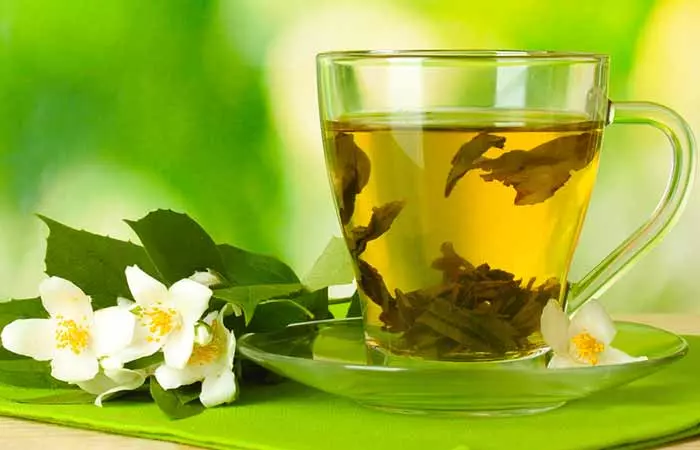
You Will Need
- 1 teaspoon of green tea
- 1 cup of water
- Honey (optional)
What You Have To Do
- Take a teaspoon of green tea and add it to a cup of water.
- Bring this to a boil in a saucepan.
- Simmer for 5 minutes and strain.
- Allow the green tea to cool a little before adding some honey.
How Often You Should Do This
Drink 3 to 4 cups of green tea daily.
Why This Works
Green tea exhibits some promising medicinal properties and is one of the best remedies for kidney stones. A natural antioxidant and diuretic, it can help get rid of toxins from your kidneys. Green tea is also a great anti-inflammatory remedy and may be used, along with treatment, to possibly treat the painful symptoms of kidney stones (8), (9). However, consult your healthcare provider before consuming green tea for this purpose.
5. Cranberry Juice
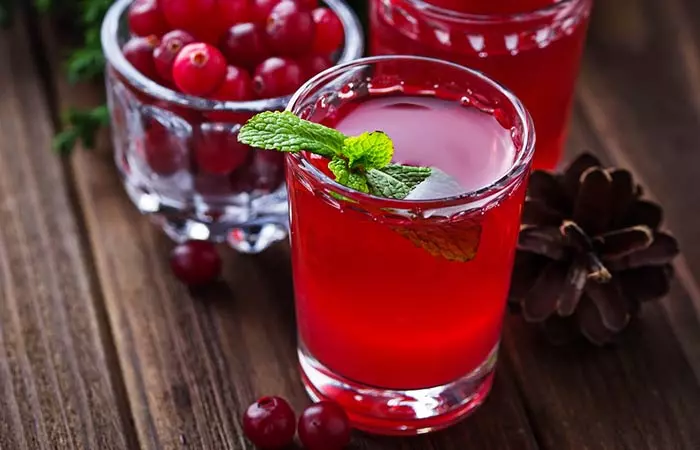
You Will Need
1 glass of unsweetened cranberry juice
What You Have To Do
Consume a glass of unsweetened cranberry juice daily.
How Often You Should Do This
Do this 1 to 2 times daily.
Why This Works
Cranberry juice is widely used for treating urinary tract infections, given its powerful diuretic properties, which are a potential treatment for kidney stones. However, there are conflicting reviews on the use of cranberry juice for this purpose, as it is believed to also increase the formation of calcium oxalate stones (10). But some research encourages the use of cranberry juice for reducing existing kidney stones (11). However, we suggest you consult your doctor on this aspect.
6. Lemon Juice
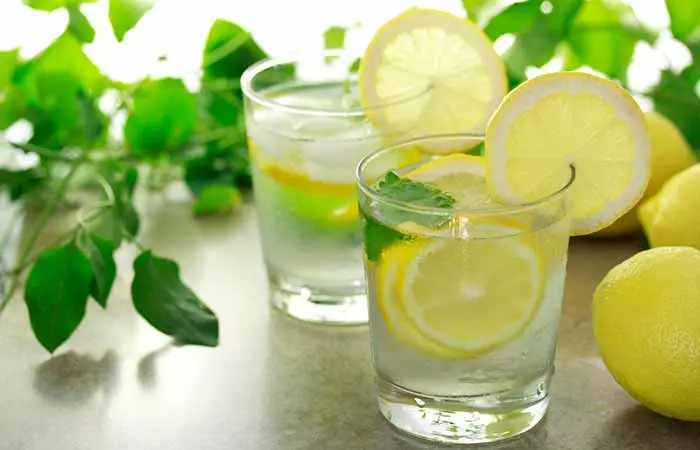
You Will Need
- 1/2 lemon
- 1 glass of warm water
- Honey
What You Have To Do
- Squeeze the juice of half a lemon into a glass of water.
- Add some honey to it and mix well.
How Often You Should Do This
Have a glass of lemon juice twice daily, first thing every morning on an empty stomach, and just before dinner.
Why This Works
Lemons are a rich source of citrate that may help dissolve kidney stones. They also have natural antioxidant and diuretic properties and help detoxify your body. The anti-inflammatory properties of lemons are a bonus as they can alleviate other horrible symptoms like pain while urination (12),(13).
Note: Frequent exposure to citric acid can wear down dental enamel. Drink lemon juice through a straw and rinse your mouth with water afterward.
7. Tomato Juice
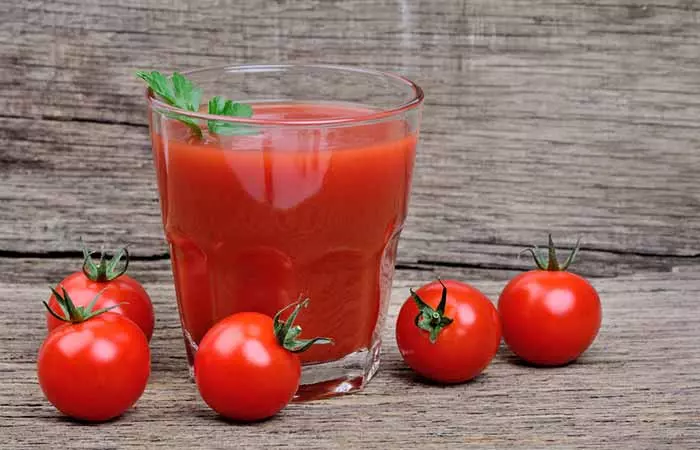
You Will Need
1 glass of unsweetened tomato juice
What You Have To Do
Consume a glass of tomato juice with a pinch of pepper.
How Often You Should Do This
Once daily.
Why This Works
Tomatoes are a rich source of lycopene, a natural antioxidant (14). Lycopene is believed to help in the treatment of kidney stones, though research is lacking in this regard.
But thanks to its anti-inflammatory properties, it may potentially help relieve the inflammation and pain associated with kidney stones (15).
Note: Tomato juice should be avoided or consumed in moderation if you have a history of oxalate stones, unless your doctor advises you otherwise.
8. Pickle Juice
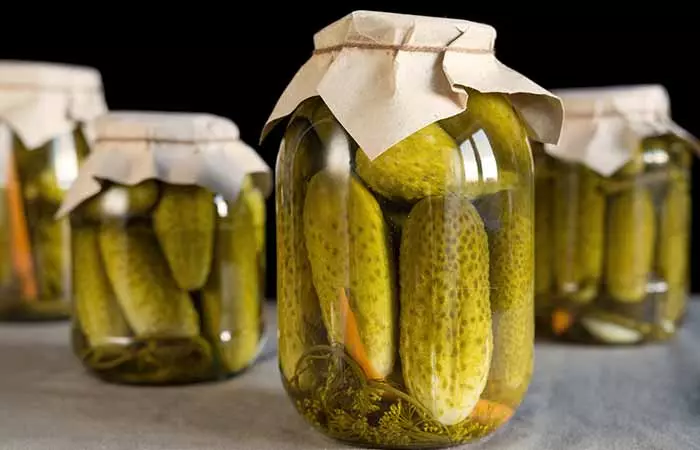
You Will Need
2 tablespoons of pickle juice
What You Have To Do
Drink pickle juice. You can dilute it with a little water, if required.
How Often You Should Do This
Drink the juice every 4 hours for a couple of days.
Why This Works
Pickle juice contains vinegar, which is primarily made of acetic acid that can help destroy kidney stones. Its anti-inflammatory properties are believed to reduce the accompanying inflammation and pain. Some research also suggests that fermented vinegar may help reduce the symptoms of kidney stones (16).
9. Basil Juice
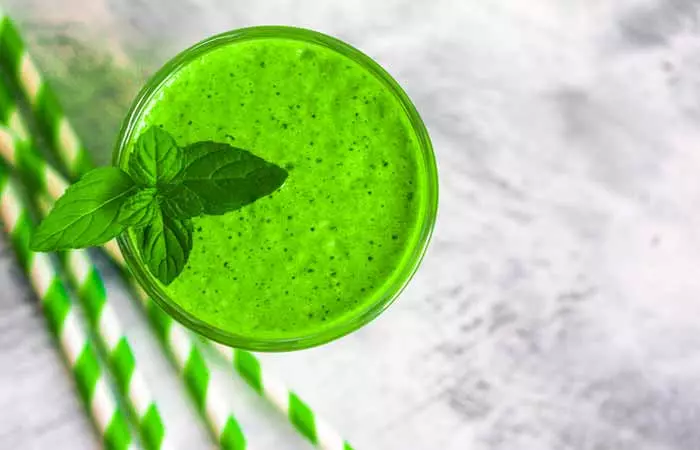
You Will Need
- 1 teaspoon of basil extract
- Honey (optional)
What You Have To Do
- Crush some basil leaves.
- Combine the extract with some honey or fruit juice to improve its taste. You can also purchase the extract from your nearest store.
How Often You Should Do This
Once daily.
Why This Works
Certain compounds in basil are thought to stabilize the uric acid levels in your body and possibly prevent kidney stone formation. Basil also exhibits antioxidant activity (17). Some believe this may help dissolve kidney stones. However, more research is warranted in this regard.
10. Water
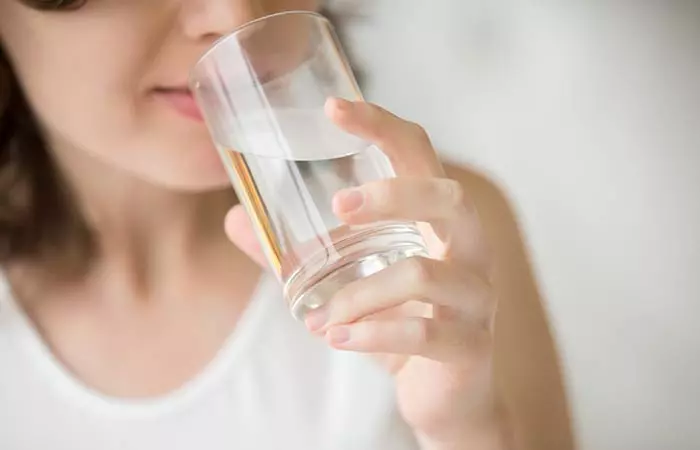
You Will Need
1 glass of water
What You Have To Do
Drink a glass of water to make your kidney stones pass through urine.
How Often You Should Do This
Do this 10 to 12 times daily.
Why This Works
Drinking enough water can prevent kidney stone formation by stalling the crystallization of certain compounds in your urine. Water helps dilute your urine, thus keeping you well hydrated and warding off the crystals (18).
11. Epsom Salt Bath
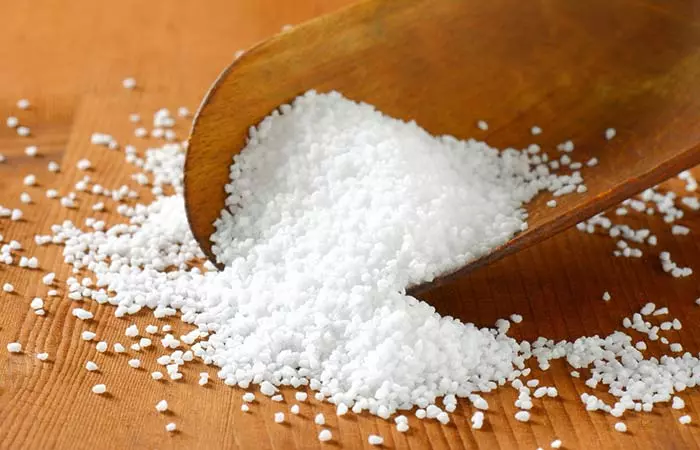
You Will Need
- 1 cup of Epsom salt
- Bathwater
What You Have To Do
- Add a cup of Epsom salt to your bathwater.
- Soak in it for 15 to 20 minutes.
How Often You Should Do This
Thrice a week.
Why This Works
Also known as magnesium sulfate, Epsom salt can increase the serum magnesium levels by being absorbed through your skin. Magnesium deficiency was found to increase kidney stone risk (19). Magnesium also may possibly inhibit the formation of calcium oxalate stones (20). Some anecdotal evidence suggests that adequate magnesium levels might cut kidney stone risk and also decrease the size of the existing stones. However, more research is needed to further understand this particular benefit of magnesium.
12. Baking Soda
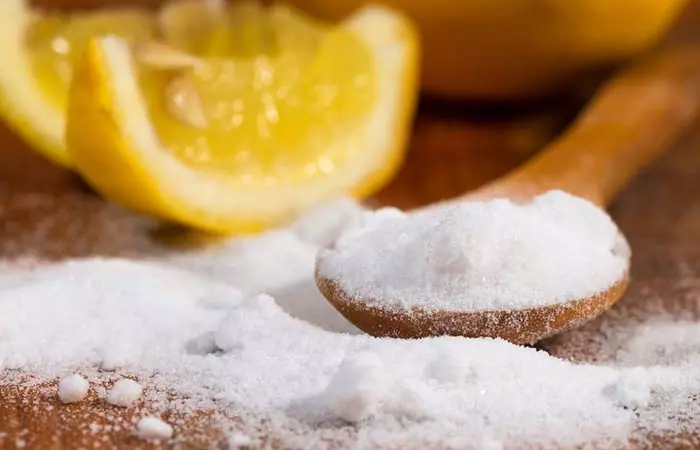
You Will Need
- 1 tablespoon of baking soda
- 1 glass of water
What You Have To Do
1. Add a tablespoon of baking soda to a glass of warm water.
2. Mix well and drink immediately.
How Often You Should Do This
2 to 3 times daily.
Why This Works
Baking soda, being alkaline, can alkalize your urine. This may help the kidney stones dissolve faster. It also restores the pH balance of your kidneys, thereby reinstating their normal functioning (21).
13. Garlic
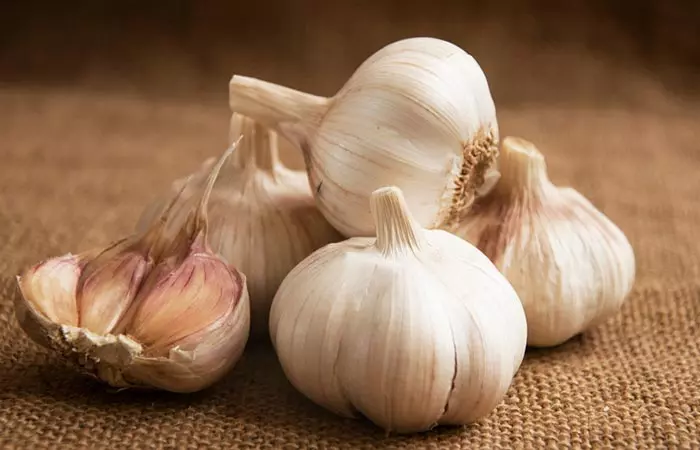
You Will Need
- 5 to 6 garlic cloves
- 1 cup of water
- Honey
What You Have To Do
- Peel the garlic cloves.
- Blend them with a cup of water and some honey.
How Often You Should Do This
1 to 2 times daily.
Why This Works
Garlic is a potent antioxidant that protects your body from free radical damage. It also acts as a diuretic that may help remove toxins from your kidneys and possibly accelerate recovery. The allicini in garlic exhibits antimicrobial and antioxidant properties (22), (23). This way, it may protect your kidneys from infection.
Note: Garlic’s sulfur compounds may lead to strong breath and body odor, which some people find unpleasant.
14. Wheatgrass Juice
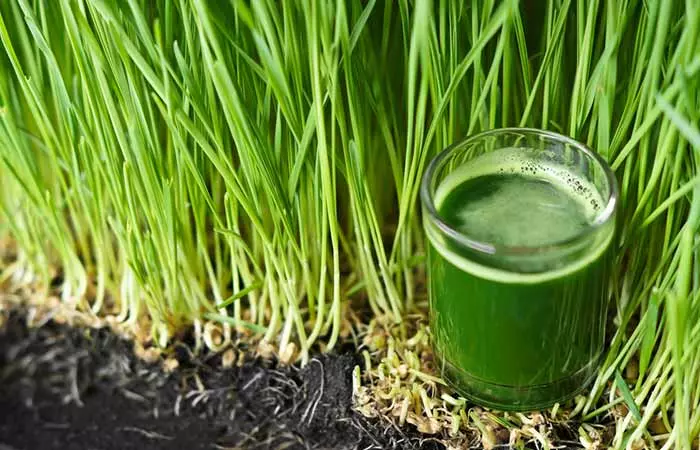
You Will Need
- 1 cup of wheatgrass juice
- Honey (optional)
What You Have To Do
- You can procure the juice from your nearest supermarket store.
- Add some honey for taste.
How Often You Should Do This
Take a cup of the juice once daily.
Why This Works
Wheatgrass is another plant with diuretic properties that help the stones pass through urine. It also exhibits antioxidant properties (24). Some believe these may protect your kidneys from free radical damage.
15. Heating Pad
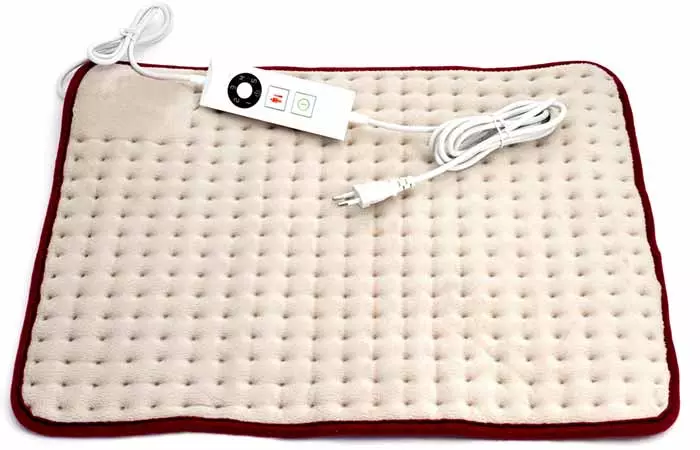
You Will Need
Heating pad
What You Have To Do
Apply a heating pad to the affected area of your body for 15 to 20 minutes.
How Often You Should Do This
Do this 2 to 3 times daily until the pain subsides.
Why This Works
Heating pads can help relieve the pain, inflammation, and swelling caused by kidney stones. The heat also helps your muscles relax, making it easier for the stones to pass. However, there is insufficient information on this, and we advise you to consult your doctor.
Remember, using heating pads as a comfort measure for kidney stones can help alleviate some discomfort. However, they are not a substitute for medical treatment. They should only be used under medical guidance. One should not delay seeking professional medical advice or intervention for kidney stones.
16. Massage

Massage therapy is another way to relieve kidney stones. A massage on the affected areas by a professional massage therapist can help you cope with the pain. Proper massage can also guide the stones to the urinary tract, accelerating their elimination. However, we recommend you undergo a massage only after your kidney stones have passed, as a follow-up treatment (25).
17. Horse gram Soup
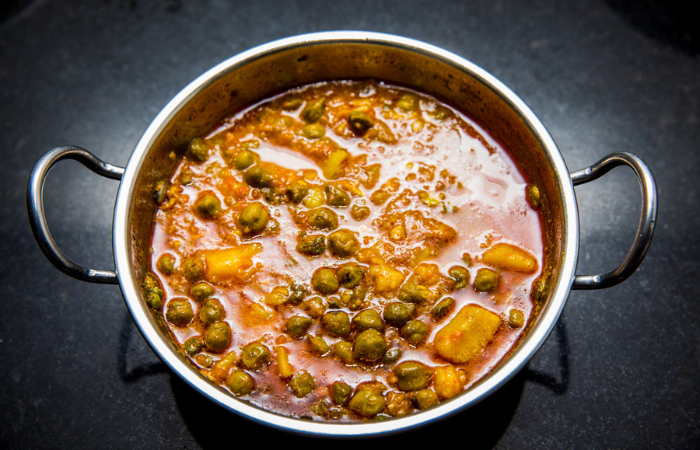
You Will Need
- 1 cup of horse gram soup
What You Have To Do
- You can make horse gram soup at your home or procure some from the market.
- Consume the soup.
How Often You Should Do This
Have a cup of soup 2-3 times weekly.
Why This Works
Horse gram is known for its potential antiurolithiatic properties that may help manage the pain associated with kidney stones. Horse gram seems to increase the concentration of compounds like magnesium and citrate that potentially help reduce the risk of kidney stones. Simultaneously, it lowers the concentration of compounds like calcium and oxalate that may contribute to kidney stone formation. Furthermore, the diuretic action of horse gram soup may help flush out elements from urine that may otherwise cause kidney stones. This promotes the dissolution of calcium oxalate stones and reduces the risk of new stones (26).
These are the ways you can treat kidney stones. The next step is ensuring they don’t recur.
Preventive Tips
The following tips may help prevent the recurrence of kidney stones (1):
- Keep yourself well hydrated by drinking enough fluids, especially water.
- Follow a diet rich in calcium; this can include foods like milk, cheese, and yogurt.
- Reduce sodium intake.
- Keep oxalate-richi A component that exists naturally in plants. Foods high in oxalates include leafy greens and legumes. foods to a minimum; they include chocolates, spinach, sweet potatoes, soy products, coffee, peanuts, and wheat bran.
- Limit or avoid animal proteins from fish, poultry, beef, and pork.
- Watch your sugar and soda intake
- Avoid vitamin C supplements as they are known to increase the risk of developing kidney stones.
- Avoid crash diets and aim for healthy eating habits.
Although these herbal remedies and a proper kidney stone diet can aid your recovery from kidney stones, it is always better to get yourself treated by a medical professional. In fact, some signs may call for an immediate visit to your doctor.
When To Visit A Doctor
Visit your doctor immediately if you experience any of the following:
- Unbearable pain in your side, groin, abdomen or genitals
- Blood in your urine
- A urinary tract infection accompanied by severe pain or burning sensation while urinating
- Severe nausea or vomiting
- Fever and chills
Infographic: 6 Home Remedies To Manage Kidney Stones
Kidney stones can, at times, cause extreme pain. You may need immediate medical attention to alleviate the symptoms or opt for a kidney stone removal surgery. But there are several home remedies that can help you manage the symptoms of mild kidney pain and possibly prevent the formation of more stones by breaking down their crystals. Check out the infographic below for a recap on these 6 home remedies.
Some thing wrong with infographic shortcode. please verify shortcode syntaxKidney stones are small, hard deposits of minerals and acid salts in the kidneys. These stones clump together in the urine and can be painful to clear. Severe pain on the side of the abdomen, dark urine, painful, frequent, and incomplete urination, and radiating shooting pain are the most common symptoms of kidney stones. Adequate hydration and medical attention are often required to treat kidney stones. In addition, you can use several home remedies like essential oils, cranberry juice, heating pad, hot compress, massage, ginger tea, and green tea to get rid of kidney stone pain. There are a few additional tips that you can keep in mind as well, like making required dietary changes, doing exercises, taking magnesium supplements, consuming nettle leaf tea or dandelion root tea, and drinking parsley juice, watermelon juice, or pomegranate juice. And while these were food alternatives, you can incorporate some healthy practices too, such as yoga, meditation, and massage therapy.
Frequently Asked Questions
What is the best sleeping position for reducing the pain from kidney stones?
It is best to use a supportive mattress and pillow while sleeping. If you are suffering from kidney stones, you must keep repositioning your body while sleeping. Sleeping on the same side might increase the pain.
How long does it take to get rid of a kidney stone?
Getting rid of a kidney stone can be extremely painful and can take anywhere from a few days to 6 weeks.
What should you not eat if you have kidney stones?
You must not eat foods that can provoke stone formation – these include beets, chocolates, spinach, and nuts. All of these are rich in oxalate, the excess of which can contribute to kidney stones. You must avoid drinking cola as well, as it might elevate disease risk due to its high phosphate content.
What is the best position to pass a kidney stone?
The best position to pass a kidney stone is lying down. Lay on the side of the pain, i.e., lie on your right side if the pain (stones) is on the right side of the ureter and vice versa.
Can kidney stones go away overnight?
No. It is rare for kidney stones to go away overnight. However, depending on the size of the stones, they may dissolve or pass within 48 hours to a few days.
What are the first signs of passing a kidney stone?
You may feel nausea, sharp or throbbing pain in your abdomen, lower back, or groin region, and gastric discomfort. You may also notice some blood in the urine and experience a sense of incomplete urination.
Can stress cause kidney stones?
Yes. Research indicates that stressful life events are associated with an increased risk of kidney stone formation (27).
Is banana good for kidney stones?
Bananas may help reduce the risk of kidney stone formation as they are rich in potassium. Potassium intake has been associated with a reduced incidence of kidney stones (28).
Illustration: Home Remedies For Kidney Stone Pain And Prevention Tips
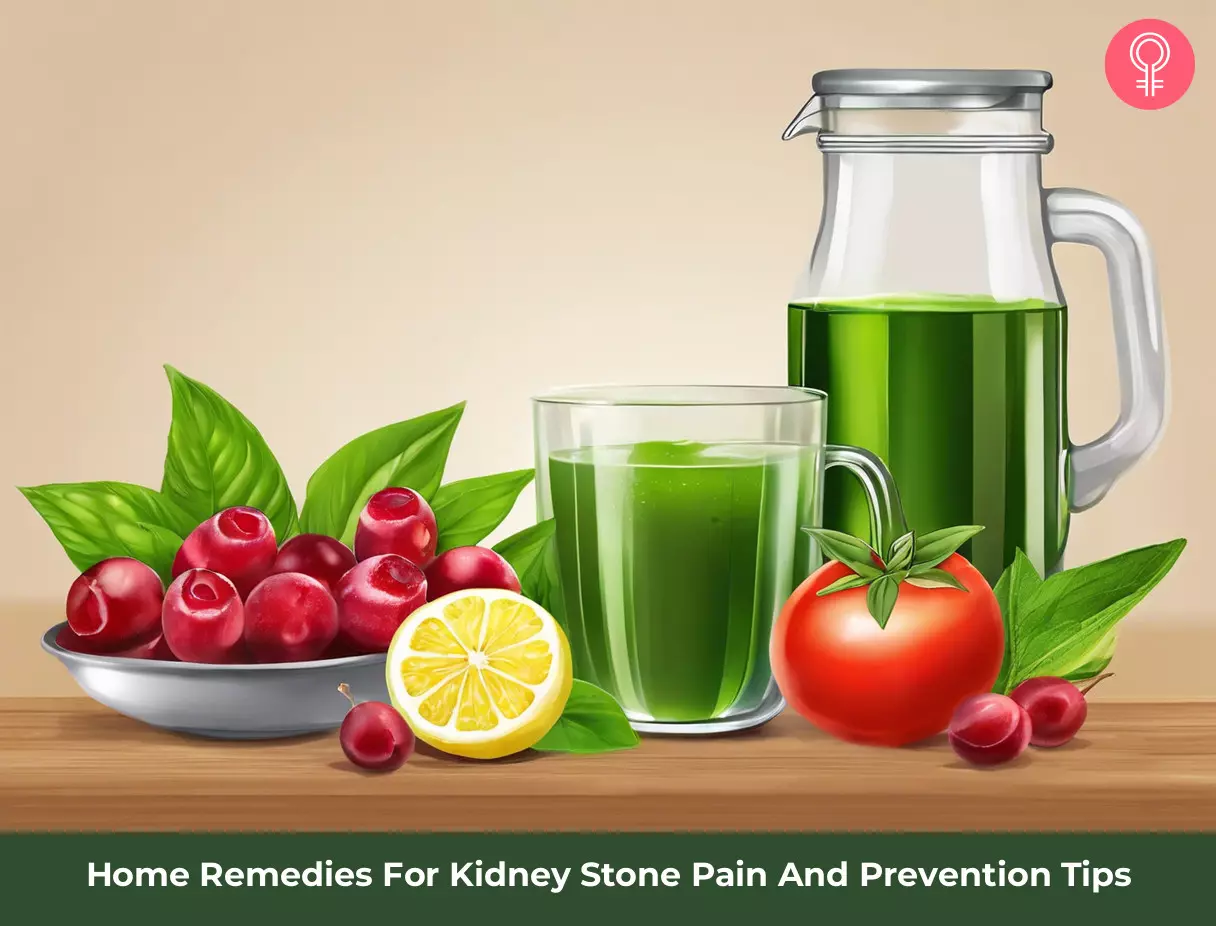
Image: Stable Diffusion/StyleCraze Design Team
Looking for natural ways to deal with kidney stones? Watch this insight to learn about five effective home remedies and diet tips that can help manage the pain caused by kidney stones and more.
References
Articles on StyleCraze are backed by verified information from peer-reviewed and academic research papers, reputed organizations, research institutions, and medical associations to ensure accuracy and relevance. Read our editorial policy to learn more.
- Nephrolithiasis
https://www.ncbi.nlm.nih.gov/books/NBK559227/ - Anti-inflammatory effects of Citrus sinensis L. Citrus paradisi L. and their combinations
https://pubmed.ncbi.nlm.nih.gov/27166529/ - Intestinal antispasmodic effects of Helichrysum italicum (Roth) Don ssp. italicum and chemical identification of the active ingredients
https://pubmed.ncbi.nlm.nih.gov/24140587/ - Anti-inflammatory and antioxidant properties of Helichrysum italicum
https://pubmed.ncbi.nlm.nih.gov/11902802/ - Intake of vitamins B6 and C and the risk of kidney stones in women
https://pubmed.ncbi.nlm.nih.gov/10203369/ - Effects of magnesium hydroxide in renal stone disease
https://pubmed.ncbi.nlm.nih.gov/6764473/ - The role of calcium in the prevention of kidney stones
https://pubmed.ncbi.nlm.nih.gov/10511317/ - Potential Interaction of Green Tea Extract with Hydrochlorothiazide on Diuretic Activity in Rats
https://www.ncbi.nlm.nih.gov/pmc/articles/PMC4897558/ - Effects of green tea on urinary stone formation: an in vivo and in vitro study
https://pubmed.ncbi.nlm.nih.gov/16724910/ - Effect of cranberry juice consumption on urinary stone risk factors
https://pubmed.ncbi.nlm.nih.gov/16006907/ - Influence of cranberry juice on the urinary risk factors for calcium oxalate kidney stone formation
https://pubmed.ncbi.nlm.nih.gov/14616463/ - Can lemon juice be an alternative to potassium citrate in the treatment of urinary calcium stones in patients with hypocitraturia? A prospective randomized study
https://pubmed.ncbi.nlm.nih.gov/18946667/ - In vitro and in vivo study of effect of lemon juice on urinary lithogenesis
https://pubmed.ncbi.nlm.nih.gov/16482864/ - Antioxidant nutritional quality of tomato
https://pubmed.ncbi.nlm.nih.gov/17427261/ - Tomato Lycopene and Inflammatory Cascade: Basic Interactions and Clinical Implications
https://pubmed.ncbi.nlm.nih.gov/20491642/ - Prevalence of kidney stones in China: an ultrasonography based cross-sectional study
https://pubmed.ncbi.nlm.nih.gov/28236332/ - Antioxidant Activity of The Ancient Herb Holy Basil in CCl4-Induced Liver Injury in Rats
https://www.ncbi.nlm.nih.gov/pmc/articles/PMC4766851/ - Self-Fluid Management in Prevention of Kidney Stones: A PRISMA-Compliant Systematic Review and Dose–Response Meta-Analysis of Observational Studies
https://www.ncbi.nlm.nih.gov/pmc/articles/PMC4504608/ - Magnesium basics
https://www.ncbi.nlm.nih.gov/pmc/articles/PMC4455825/ - Magnesium therapy for nephrolithiasis
https://pubmed.ncbi.nlm.nih.gov/16100850/ - The effect of sodium bicarbonate upon urinary citrate excretion in calcium stone formers
https://pubmed.ncbi.nlm.nih.gov/23602798/ - The antioxidant properties of garlic compounds: allyl cysteine alliin allicin and allyl disulfide
https://pubmed.ncbi.nlm.nih.gov/16822206/ - Diuretic natriuretic and hypotensive effects produced by Allium sativum (garlic) in anaesthetized dogs
https://pubmed.ncbi.nlm.nih.gov/2056760/ - Evaluation of the antioxidant activity of wheatgrass (Triticum aestivum L.) as a function of growth under different conditions
https://pubmed.ncbi.nlm.nih.gov/16521113/ - Massage therapies
https://www.ncbi.nlm.nih.gov/pmc/articles/PMC1071543/ - Effect of Macrotyloma uniflorum in ethylene glycol induced urolithiasis in rats
https://www.ncbi.nlm.nih.gov/pmc/articles/PMC7327257/ - Stressful life events and risk of symptomatic kidney stones
https://pubmed.ncbi.nlm.nih.gov/9363523/ - Dietary Protein and Potassium Diet–Dependent Net Acid Load and Risk of Incident Kidney Stones
https://www.ncbi.nlm.nih.gov/pmc/articles/PMC5053786/
Read full bio of Dr. Jill Carnahan
Read full bio of Shaheen Naser
Read full bio of Arshiya Syeda
Read full bio of Dipti Sharma







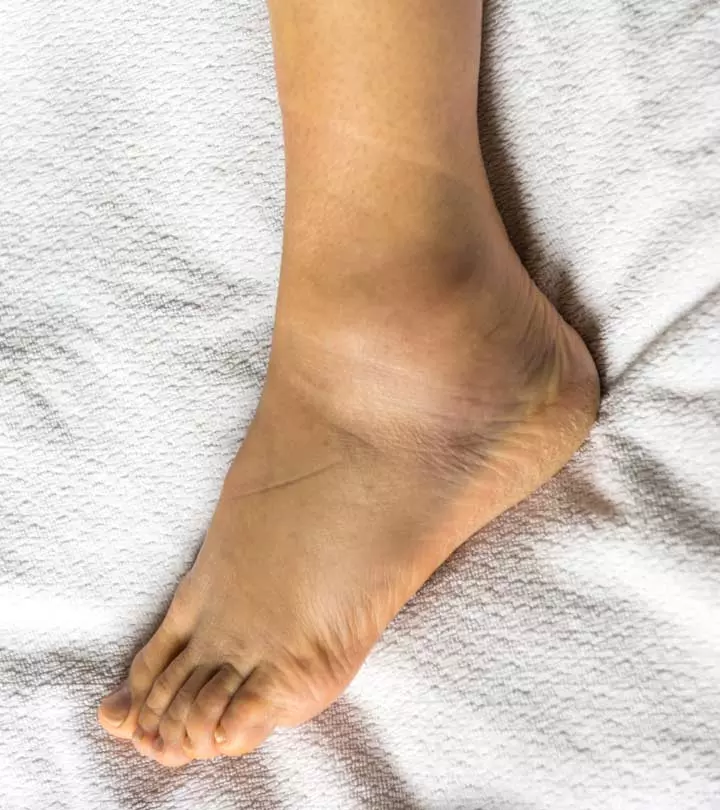

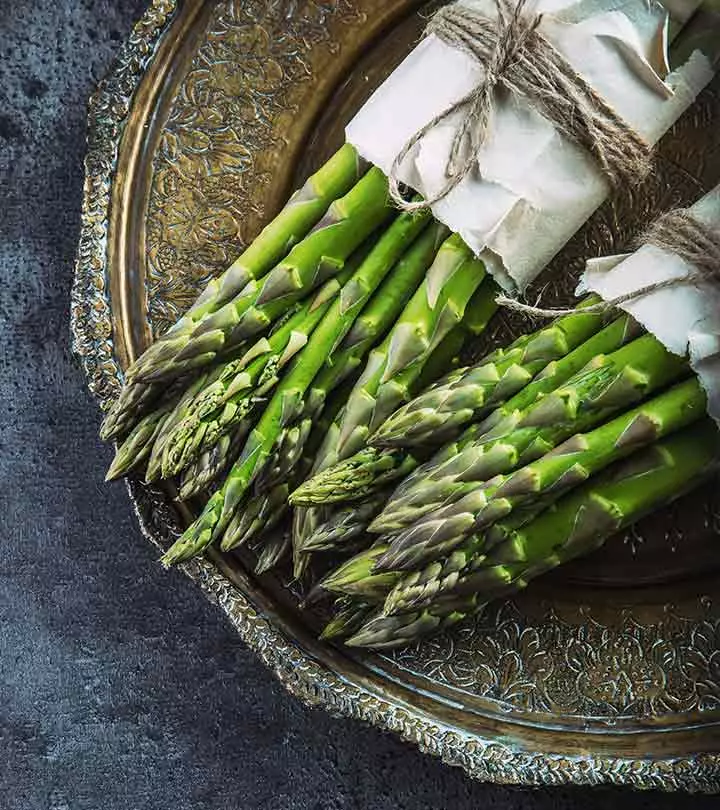

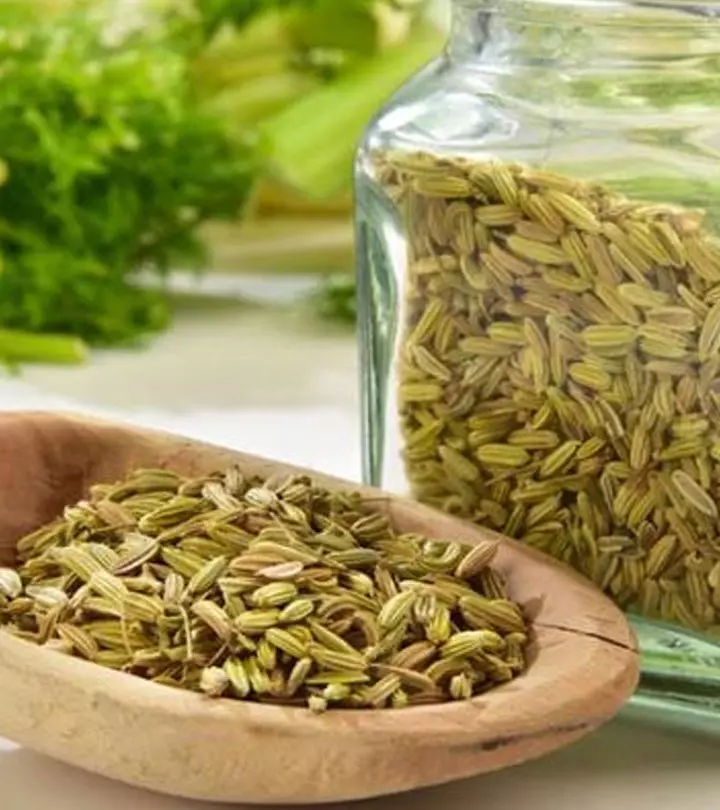

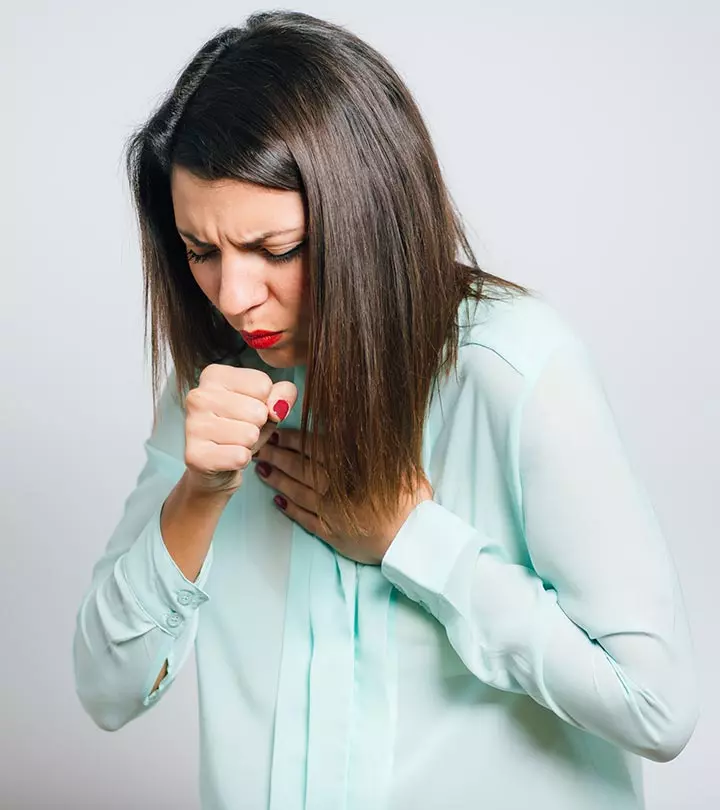
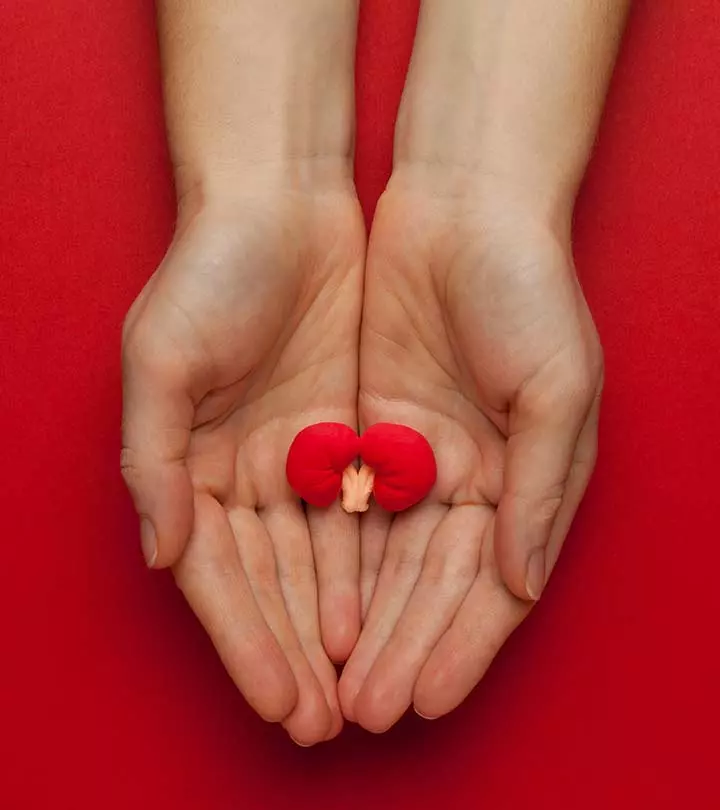
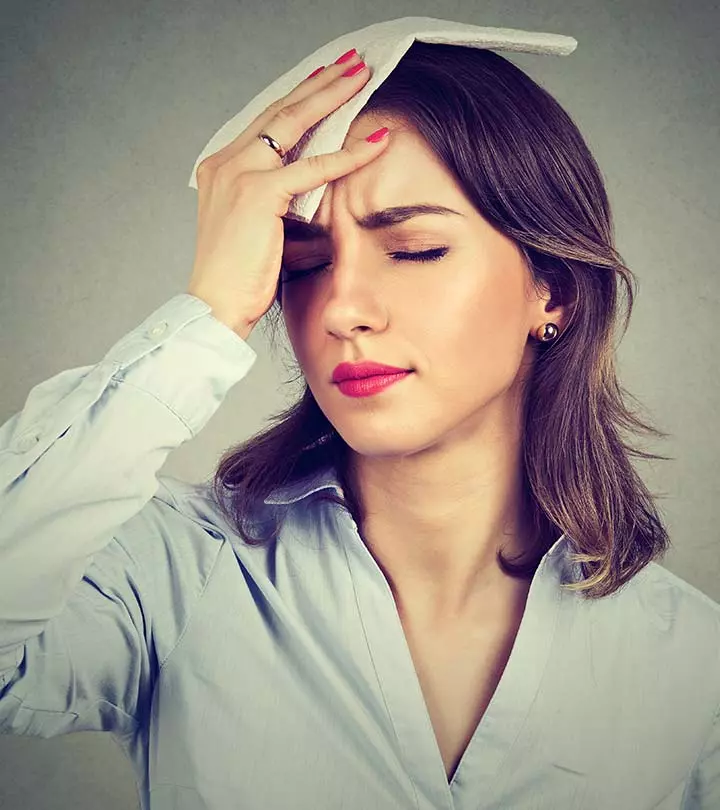
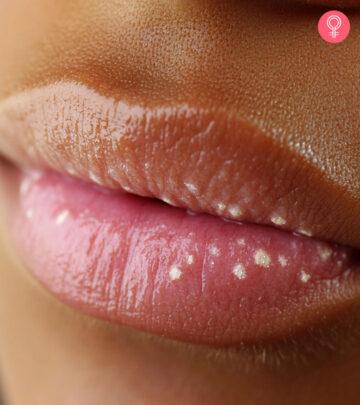
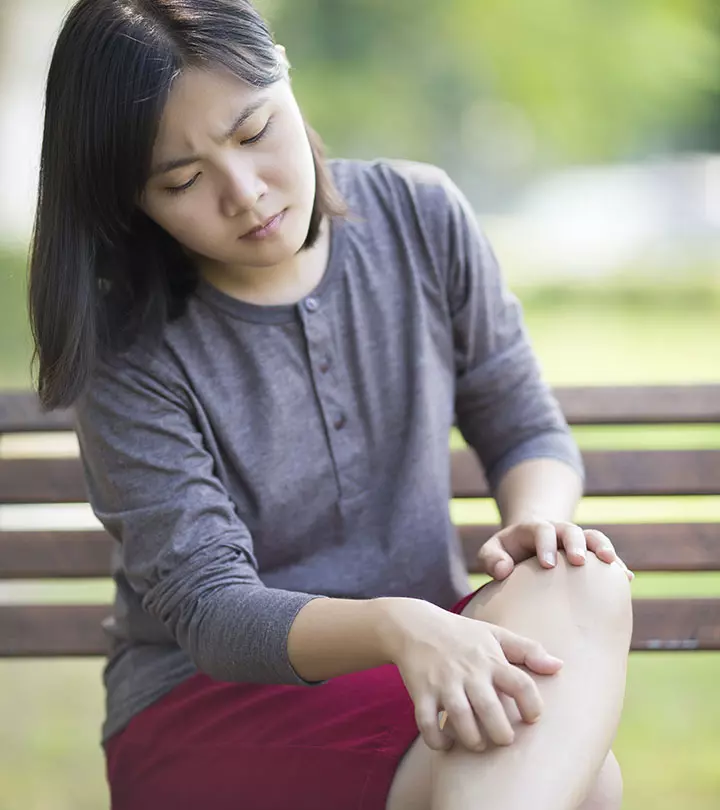


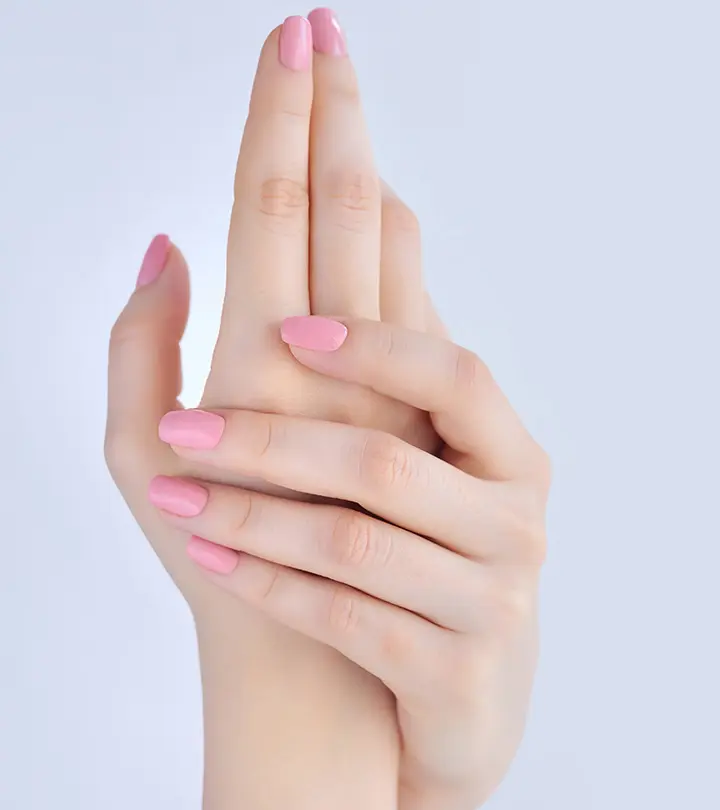
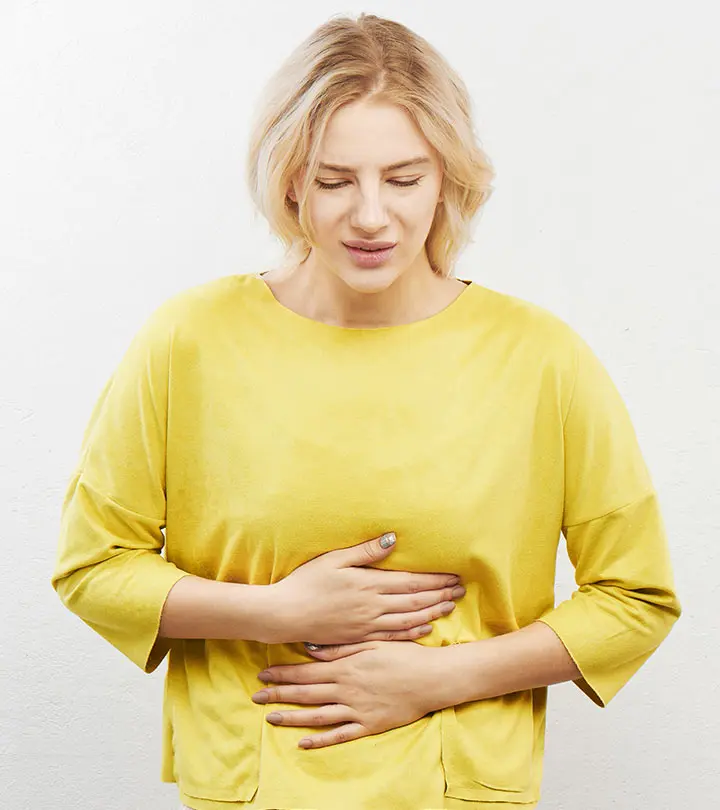


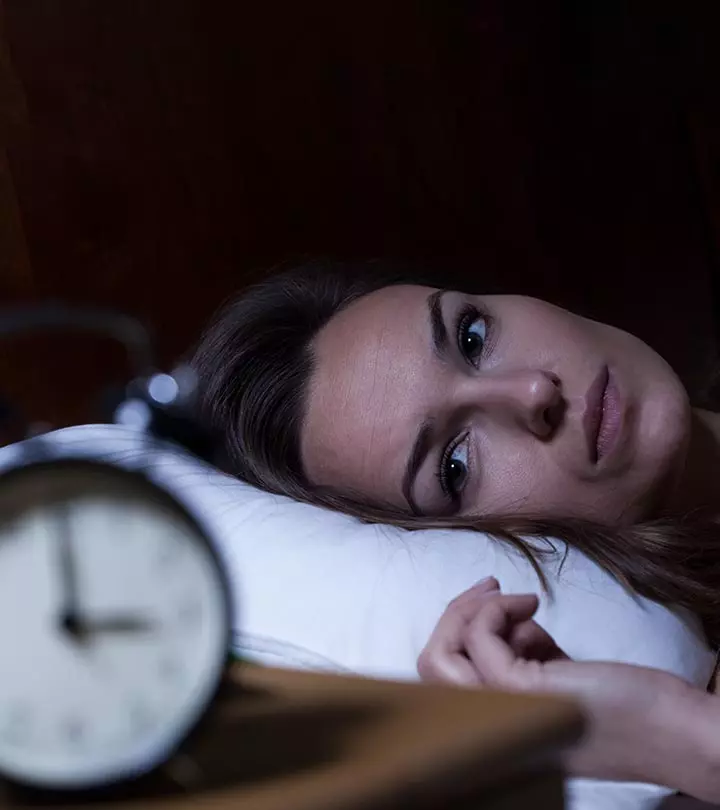


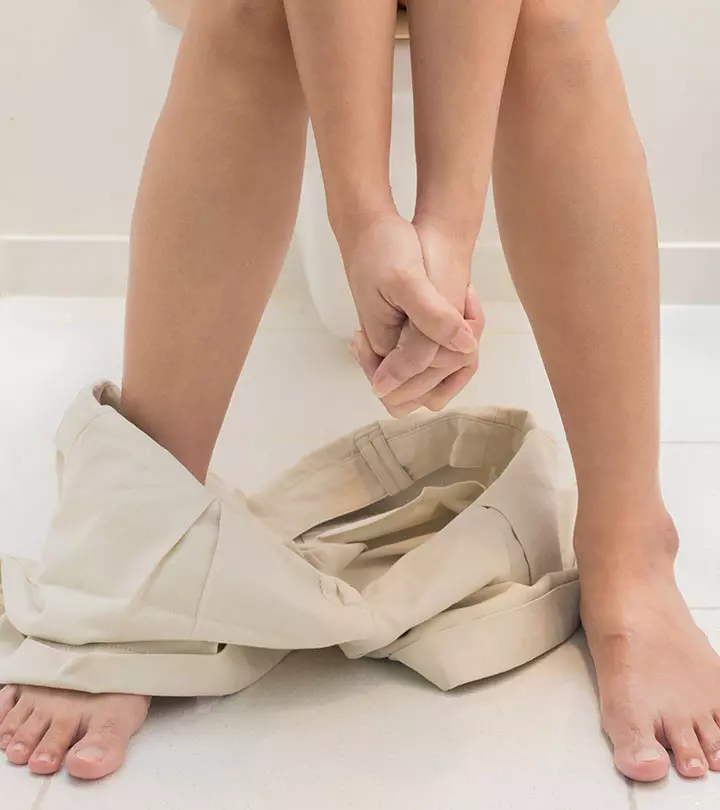
Community Experiences
Join the conversation and become a part of our empowering community! Share your stories, experiences, and insights to connect with other beauty, lifestyle, and health enthusiasts.